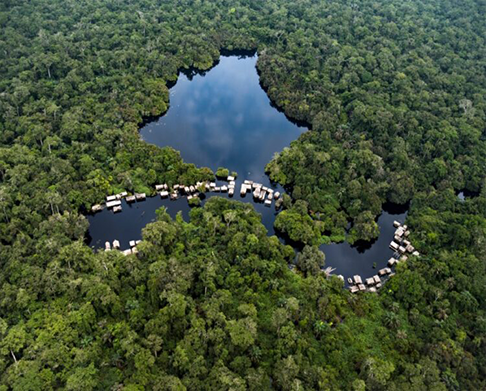News
PRESS RELEASE !
Subject: Support for members and partners of the Congo Basin Forest Partnership (CBFP),
It is with great respect and a deep sense of responsibility that we, the Africa Climate Action Initiative (ACAI), support the 20th Meeting of the Parties of the Congo Basin Forest Partnership (RDP20) which will be held from 3 to June 5, 2024 in Kinshasa, Democratic Republic of Congo. This approach aims to strengthen our collective commitment to the sustainable management and conservation of the Congo Basin, a critical global resource, and to catalyze transformative actions that align with a shared vision for a sustainable and prosperous future.
The Congo Basin, which is full of vast tropical rainforests and biodiversity hotspots, is not only vital to the ecological balance of the region, but also serves as an important carbon sink, playing a vital role in mitigating the global climate change. However, the basin faces unprecedented threats from deforestation, illegal logging, mining activities and the impacts of climate change. These challenges require an urgent, coordinated and multifaceted response to ensure the sustainability of this irreplaceable natural heritage.
In light of these pressing issues, ACAI encourages a comprehensive framework that integrates conservation efforts with socio-economic development, leveraging innovative financial mechanisms and fostering inclusive governance. We support the principles of environmental integrity, social equity and economic sustainability, aiming to strengthen the resilience of Congo Basin ecosystems while improving the livelihoods of local communities.
First of all, ACAI highlights the importance of strengthening the legal and institutional frameworks that govern forest management. We support the harmonization of national policies with international environmental standards and conventions, ensuring that regulatory frameworks are robust, transparent and enforceable. This includes strengthening monitoring and enforcement mechanisms to combat illegal activities and promoting sustainable land use practices that balance conservation and development needs.
To achieve these objectives, ACAI encourages the Congo Basin Environmental Compliance and Monitoring Working Group. This working group, comprised of representatives from government agencies, civil society, indigenous communities and international partners, oversees the implementation of forest management regulations, conducts periodic assessments and ensures accountability. This working group also facilitates capacity building initiatives, providing technical assistance and training to local authorities and stakeholders to strengthen their capacity to effectively manage and protect forest resources.
Financial sustainability is paramount to the success of our conservation efforts. Therefore, ACAI encourages the mobilization of diverse sources of financing, including public-private partnerships, international climate finance and innovative financial instruments such as green bonds and carbon credits. By creating an environment conducive to investment, we can attract private sector participation and mobilize additional resources for conservation projects.
We encourage the Congo Basin Forest Fund to invest in those on the front lines of climate change, local communities and indigenous peoples by helping them secure and manage the forests on which they depend. And finally support priority projects aimed at forest conservation, sustainable agriculture and the development of renewable energies. We also support the Congo Basin Blue Fund which allows the States of the Congo Basin sub-region to move from an economy linked to the exploitation of forests to an economy relying more on resources from management. some water.
Furthermore, ACAI encourages the integration of payment systems for ecosystem services (PES) into the financial architecture of the Congo Basin. The (PES) programs provide financial incentives to landowners and communities to maintain and improve ecosystem services, such as carbon sequestration, water purification and biodiversity conservation. By monetizing the ecological value of forests, PES can generate sustainable income streams for local communities while promoting conservation-friendly practices.
Recognizing the central role of local communities and indigenous peoples in forest management, ACAI emphasizes the need for their active participation and empowerment. We support the implementation of community-based forest management (CBFM) approaches, which involve local communities in decision-making processes and grant them legal rights and responsibilities over forest resources. This participatory approach not only improves the effectiveness of conservation measures, but also ensures that benefits from forest resources are equitably distributed.
ACAI also highlights the importance of promoting sustainable livelihoods as a means of reducing dependence on logging. We encourage the development of alternative income-generating activities, such as agroforestry, ecotourism and non-timber forest product (NTFP) businesses. By diversifying income sources and providing training and support to these businesses, we can improve the economic resilience of forest-dependent communities and reduce pressure on forest ecosystems.
In addition to these on-the-ground initiatives, ACAI highlights the need to leverage scientific research and technological innovation to improve conservation outcomes. We support the Congo Basin Research and Innovation Hub, which facilitates collaboration between researchers, policy makers and practitioners. This cluster focuses on the development and dissemination of cutting-edge technologies and methodologies for forest monitoring, climate adaptation and sustainable resource management. By fostering a culture of innovation and knowledge exchange, we can improve the effectiveness of our conservation strategies and adapt to emerging challenges.
Additionally, ACAI calls for increased regional cooperation and coordination among Congo Basin countries. The transboundary nature of the basin's ecosystems requires a concerted effort to address common challenges and take advantage of collective opportunities. We encourage subregional and international commissions and organizations for the conservation of the Congo Basin, which facilitate information sharing, joint planning and synchronized implementation of conservation initiatives. These organizations and commissions also serve as a platform to advocate the interests of the Congo Basin in international forums and attract global support for conservation programs..
The ACAI emphasizes the importance of robust data collection and information management systems. Accurate and timely data is essential for informed decision-making and effective resource allocation. We support the development of Congo Basin environmental information systems, which integrate data from a variety of sources, including remote sensing, field surveys and community reports. These systems provide real-time information on forest cover changes, biodiversity status and impacts of conservation interventions, enabling adaptive management and accountability.
In conclusion, the ACAI is committed to working in collaboration with CBFP members and partners to achieve our common objectives of conserving the Congo Basin forests and improving the well-being of its population. Our support and encouragement aims to create a sustainable and resilient future for the basin, leveraging innovative financial mechanisms, empowering local communities and fostering regional cooperation. We believe that by adopting this approach, we can safeguard the ecological integrity of the Congo Basin while promoting sustainable development and prosperity for its inhabitants.
We urge all PFBC members to endorse and support our contribution, recognizing that our collective efforts are crucial to the success of our conservation efforts. Together, we can ensure that the Congo Basin remains a vital and vibrant ecosystem for generations to come.

